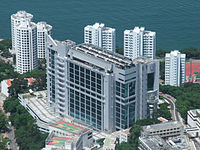- Medical education in Hong Kong
-
Main article: Health in Hong Kong
Medical education in Hong Kong is concerned with both the basic training of medical practitioners and further post-graduate training.
Contents
Medical school
 Li Ka Shing Faculty of Medicine, one of the two medical schools in Hong Kong
Li Ka Shing Faculty of Medicine, one of the two medical schools in Hong Kong
Undergraduate-entry program typically last five years, and permit entry from secondary school matriculation. Entry to the two medical faculties of Hong Kong (The University of Hong Kong and the The Chinese University of Hong Kong) requires completion of the HKALE or its equivalent (e.g. GCE "A" Levels).
Prospective medical students may apply through the JUPAS (Joint University Programmes Admissions System) exercise that takes place yearly. Increasingly, form six students who have done exceptionally well in their HKCEE level examination will be granted entry. The undergraduate intake is about 160 in each university. Mature students or students who already possess a undergraduate degree may apply to each individual university, and they will join the undergraduate class.
In early years, theoretical domains of study predominate, with increasing clinical focus during the program. However, early clinical exposure — in which students commence clinical skills from very early in the course, concurrently with theoretical study — is a component of many degrees, most notably the graduate medical programs. Hong Kong University there has been a move away from the more traditional methods of teaching with a shift towards the Problem Based Learning (PBL) pedagogy.
After graduation medical students enter paid employment, but they are still a year away from obtaining full registration and obtaining their degrees During this year trainees are legally only able to work in certain highly supervised jobs (designated F1 jobs) and cannot legally practise independently.
Internship
Recently qualified medical practitioners must successfully undertake and complete at least one year of supervised practice, generally known as an internship. Internship is undertaken in hospital positions accredited for this purpose.
A new medical graduate's first job will be as a Pre-registration house officer (PRHO), during which they will complete the first year of Foundation Training (F1 Year). Although by this time, they have graduated from the university, it is the responsibility of the medical school they attended to supervise this year until they are fully registered with the Hong Kong Medical Council. Therefore, the Pre-registration house officer year forms the final year of medical school.
Residency
Upon successful conclusion of the intern year, doctors qualify for a full registration in the Medical Board and are licensed to engage in independent medical practice.
Specialist training
A trainee has to undergo six years of supervised specialist training and pass in the final examinations held by Hong Kong Academy of Medicine. Passing the final examination is a prerequisite to Fellowship of the Academy.
At the same time as working in hospitals, registrars also prepare for examinations for admission into specialist medical colleges.
Those successful in completing the requirements of their college program become a fellow of the academy and "specialists" in the case of most areas of medicine (and typically work in specialist private practice and/or as a "consultant" in a hospital); an exception are fellows of the Royal Australian College of General Practitioners, who are general practitioners, not specialists.
Graduate Entry Medicine
Graduate entry medical programs are the current global trend in medical education.[citation needed] Medical schools in UK[citation needed], Australia, New Zealand[citation needed] & Singapore are converting their traditional MBBS or MBChB courses to 4-year graduate entry programs. However, the two medical schools in Hong Kong do not offer such programs.
See also
References
Wikimedia Foundation. 2010.
